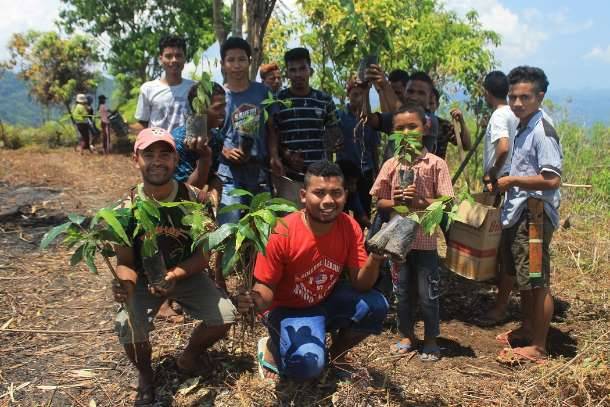Catholic priest promotes care for creation to advance Church’s social teaching

Father Wilibrodus Andreas Bisa, OFM, pioneered and implemented pastoral ecopedagogy in his parish ministries at St. Francis of Assisi Church in Tentang, Flores, Indonesia.
For him, by putting forward the ecopedagogical paradigm, what he wants to highlight is the reflection of humans who always see themselves as children and students of the earth, who are "mothers" and "teachers" (Mater et Magistra).
The priest said that being a good Christian farmer is about protecting and preserving nature, giving farmers back their independence and sovereignty, and developing a spirituality that honors all of God's creation.
According to Father Bisa, like Mother Earth, the earth bribes and nurtures us by growing a variety of fruits along with colorful flowers and grass.
Meanwhile, as a teacher, he added, the earth shows itself as a "university of life," which gives wisdom and understanding that humans are an integral part that cannot be separated from and integrated with nature.
Considering that the Church's social teaching requires "concern for the environment," he emphasized that ecopedagogy is a concept of continuing education that can be included in catechesis, faith formation, and pastoral care.
By preventing anyone from using at will the various classes of creation (animate or inanimate), whether animate or inanimate (wildlife plants, natural elements), Father Bisa argues that this is a matter of mutual and universal obligation.
According to the priest, ecopedagogy aims to educate children and students, and the faithful about current issues such as the destruction of nature, air, water, food, forests, animals, and plants; climate change; ozone depletion; the human communication crisis; reliance on technology; and the end of the war.
He explained that ecopedagogy, as the foundation for sustainable development education, provides four teaching systems:
They were first preparing environmental texts for children to reveal current ecological issues, the roots of problems, and strategies to respond to topics, both individually and collectively, he said.
Second, teaching in social and natural environments helps students understand their relationship to the environment. He explained that teachers could include experiences and perspectives on animals, forests, mountains, and oceans outside the classroom.
As for the third, he said that teaching through the social and natural environment, i.e., transforming knowledge into social action, environmental justice, welfare, and sustainability,
The fourth, he says, is the teaching of continuous interrelationships between creatures.

The Encyclical Spirit of Laudato Si and Pastoral Ecology
For example, Father Bisa has used pastoral ecology to teach sustainable ecopedagogical education in several parishes where he works, such as St. Francis of Assisi in Tentang, Indonesia, where he is the priest.
The eco-pastoral model, he says, has assisted farmers through their indigenous knowledge and cannot be divorced from the Church's pastoral work.
Father Bisa says that the Catholic Church's encyclical, Laudato Si, helps farmers because it helps them use their knowledge.
He said that service to farmers who keep nature's integrity is a moral and religious movement that everyone should know about. This will help many people.
Father Bisa believes preaching and pastoral ministry bring the gospel message from the altar to the farmers' fields through ministry.
He added that farmers were invited and informed that being a farmer is not a fate but a call to revitalize many people and care for mother earth wisely through the seeds sown.
This program, he claims, is a component of the Pastoral Year of Holistic Tourism of the Ruteng Diocese, which makes the ecology program a priority.
"We want to give a message to all that nature is a place of encounter with God and self," he recalled Bishop Hormat’s statement during the declaration of the Year of Holistic Tourism 2022 last January.
In this spirit, Father Bisa has made an effort to encourage people to care about the environment. One such step is through collaboration with traditional community leaders.
This method is based on the idea that people already know how to be good stewards of the environment because of their interactions with nature and cultural activities.
There is cosmological wisdom that demonstrates how forests and humans can coexist. He said forests and their contents are essential to humans every day, and they need to be protected to keep their symbiotic relationship going.
People have a very close social-cultural relationship with the forest, which is shown by traditional ceremonies like preserving the forest or giving thanks after harvesting.
“We then look for actions that can be taken that depart from this wisdom,” he explained. Also, "there is room for me to use Christian teachings such as Laudato Si on the importance of caring for the earth," he said.
Apart from community leaders, Father Bisa seeks collaboration with local governments because, in his opinion, the only way to effect change is for religious leaders, community leaders, and government leaders to unite.
For World Tree Day, he started conservation projects and signed a deal with all the parish pastoral councils in the parish to work together.
Water Day, World Day Against Desertification and Drought, Earth Day, Environment Day, and Biodiversity Day took place on the same day.
He claimed that ecopedagogical religious activities help people have more faith and help the environment care for itself and love.
St. Francis of Assisi Parish is located in Indonesia's East Nusa Tenggara Province, in the Diocese of Ruteng, West Manggarai Regency. The parish has eight stations and serves around 8,000 people
Radio Veritas Asia (RVA), a media platform of the Catholic Church, aims to share Christ. RVA started in 1969 as a continental Catholic radio station to serve Asian countries in their respective local language, thus earning the tag “the Voice of Asian Christianity.” Responding to the emerging context, RVA embraced media platforms to connect with the global Asian audience via its 21 language websites and various social media platforms.

















- Reply
Permalink